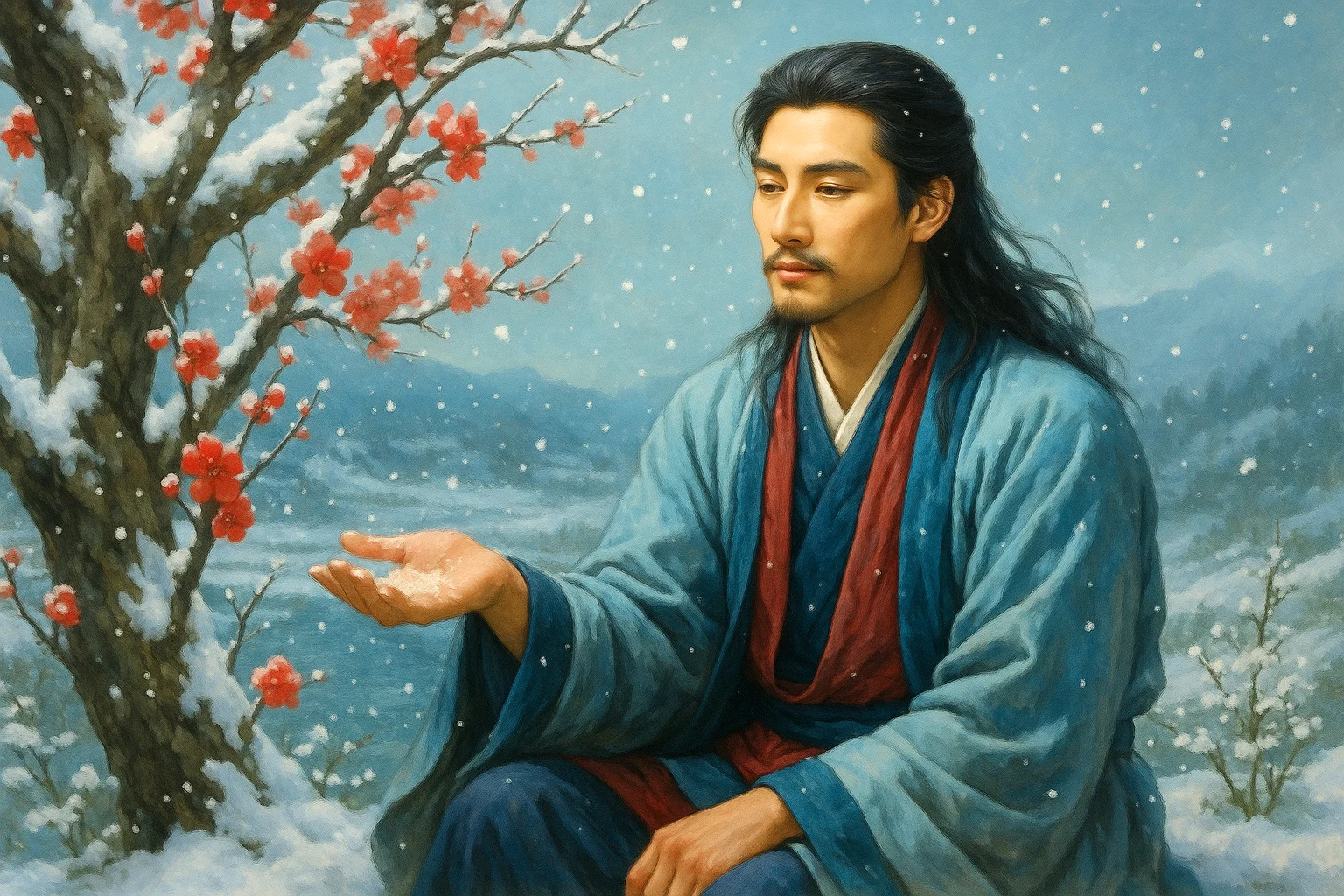Wild geese, daunted by layered clouds, refuse to cry,
My painted boat grieves past Stone-Pond westward nigh,
As raging winds and waves assault the prow awry.
Spring creeks grow emerald to greet our oar's slow ply,
Plum buds near the gate should swell toward the sky,
While year-end lanterns call the wand'rer home to hie.
Original Poem
「浣溪沙 · 丙辰岁不尽五日吴松作」
姜夔
雁怯重云不肯啼,画船愁过石塘西,打头风浪恶禁持。
春浦渐生迎棹绿,小梅应长亚门枝,一年灯火要人归。
Interpretation
Composed in late 1196 during Emperor Ningzong's reign, this ci poem was written by 42-year-old Jiang Kui while returning home from Wuxi, pausing at Wusong. Having recently moved his family to Hangzhou under Zhang Jian's patronage, the poet—a lifelong wanderer with no official post—rarely enjoyed stable reunions during festivals. Written five days before New Year's Eve, it captures the hardships of stormy travel and yearning for home, blending profound emotion with restrained melancholy.
First Stanza: "雁怯重云不肯啼,画船愁过石塘西,打头风浪恶禁持。"
Yàn qiè chóng yún bù kěn tí, huà chuán chóu guò Shítáng xī, dǎ tóu fēnglàng è jìn chí.
Wild geese, daunted by leaden clouds, fly mute;
My painted boat, sorrow-laden, skirts Stone Pond's route.
Bow battered by vicious winds—how to proceed?
The opening stanza paints a journey's trials through nature's resistance. The "mute geese" (雁怯重云) mirror the traveler's silent anxiety, while the "battered bow" (打头风浪) embodies life's relentless adversities. These elemental obstacles—clouds, waves, wind—form a somber palette reflecting the poet's strained homecoming.
Second Stanza: "春浦渐生迎棹绿,小梅应长亚门枝,一年灯火要人归。"
Chūn pǔ jiàn shēng yíng zhào lǜ, xiǎo méi yīng zhǎng yà mén zhī, yī nián dēnghuǒ yào rén guī.
Spring creeks grow emerald to greet my oar;
By our gate, plum twigs must now soar.
New Year's lanterns summon the wanderer home once more.
Here, the imagery softens into hopeful warmth. "Emerald creeks" (迎棹绿) and "soaring plum twigs" (亚门枝) symbolize domestic renewal, while the "lanterns' summons" (灯火要人归) personifies familial longing. This quiet transformation—from stormy struggle to tender anticipation—reveals Jiang's mastery of emotional crescendo in minimalist strokes.
Holistic Appreciation
The entire poem, through the lens of returning home, creates an emotional atmosphere that blends movement and stillness, sorrow and joy. The first stanza depicts the hardships and storms along the journey, metaphorically reflecting the obstacles in life's voyage. The second stanza, however, employs tender imagery—spring waters greeting the oars, young plum branches sprouting, and lamplight awaiting the traveler—to evoke the poet's profound longing for home. This transition from external desolation to inner warmth not only mirrors a shift in emotional rhythm but also reveals the poet's deepened and nuanced understanding of home after weathering life's trials.
Particularly striking are the contrasting lines "wild geese cower under layered clouds" and "spring shores welcome the boat." One paints a sky heavy with melancholy, the other a water surface tinged with the first breath of spring. This interplay of the tangible and intangible, the distant and near, lends the poem an ethereal depth without descending into overt sentimentality.
Artistic Merits
The poem's most distinctive feature is its use of somber scenes to convey joy and understated strokes to express profound meaning. Instead of directly depicting festive jubilation, the opening lines employ cold-toned imagery—winds, waves, dense clouds, and muted geese—to heighten the urgency of homecoming, creating psychological tension. The second stanza, though seemingly plain, brims with quiet warmth. The line "young plum branches must now reach past the door" is both a scenic detail and a symbol—hinting at children's growth, the passage of time, and delayed reunions, rich with the flavors of daily life and human tenderness. The closing line, "lamps alight for a year, waiting for my return," serves as both thematic anchor and emotional resolution, leaving the reader with lingering resonance.
Linguistically, the poem balances colloquial expressions like "couldn’t bear" (禁持) and "must now" (应长), which ground it in everyday speech, with poetic phrases such as "the painted boat glides, heavy with sorrow" and "spring shores welcome the boat," creating a harmonious blend of the refined and the vernacular.
Insights
This poem reminds us that poetry does not always reside in bustling festivities; it can also emerge from a journey home, a gust of wind, or the budding branch of a plum tree. With his restrained brushstrokes, Jiang Kui captures the enduring pull of home and the sense of belonging that persists through life's wanderings. This "yearning for home," born of life's transience, remains deeply moving even in modern times. For us, no matter where we are, home is always that lamplight—the most genuine and tender tether in our lives.
About the poet

Jiang Kui (姜夔, c. 1155 - 1221), a native of Poyang, Jiangxi, was a Southern Song Dynasty lyric poet and musician. He remained a commoner throughout his life. His lyrics are known for their ethereal and austere style, and his poetry is also highly regarded. Along with Fan Chengda and Yang Wanli, he is celebrated as one of the "Four Great Masters of the Restoration."












